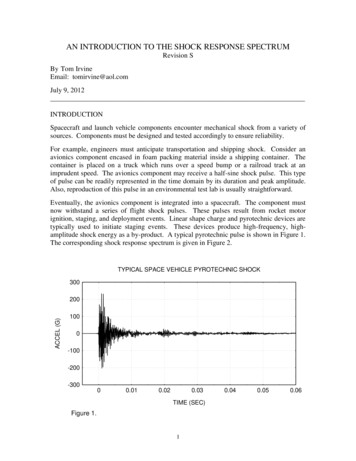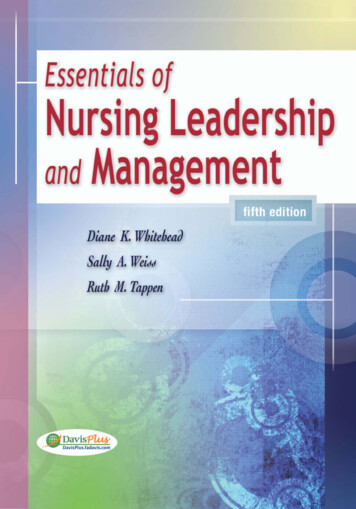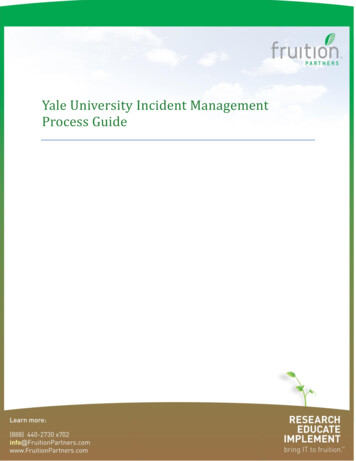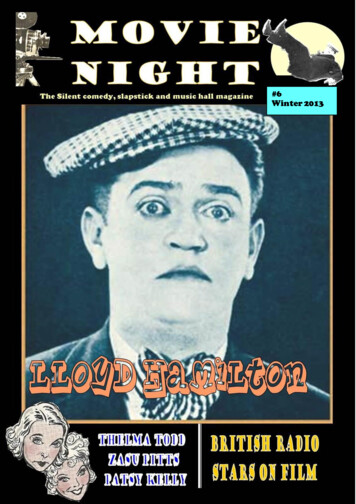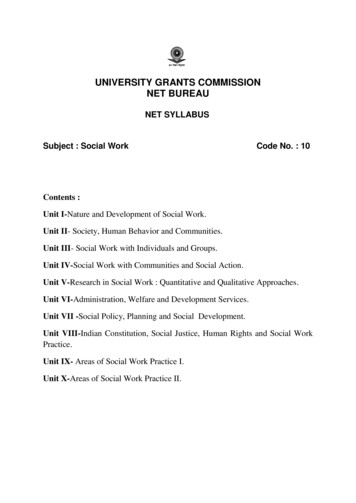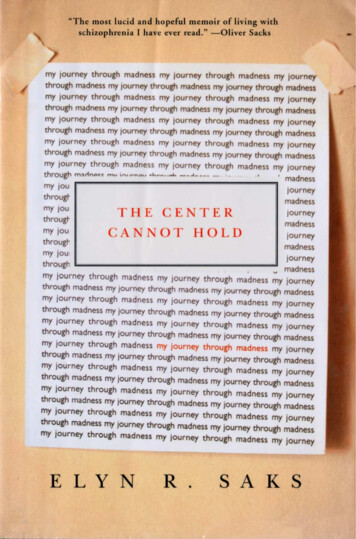
Transcription
"The most lucid and hopeful memoir of living withschizophrenia I have ever read." -Oliver Sacksmy journey through madness my journey through madness my journeythrough madness my journey through madness my journey through madnessmy journey through madness my journey through madness my journeythrough madness my journey through madness my journey through madnessmy journey through madness my journey through madness my journeythrough madness my journey through madness my journey through madnessmy journey through madness my journey through madness my journeythrough madness my journey through madness my journey through madnessmy journey through madness my JOurney through madness my JOurneythrough m: rln « ,.,.,v ;,., .,.,., . -. . . - - . --· ·madnessmy JOUjourneymadnessmy joujourneythroug madnessmy jouCA N N 0 T H 0 L Djourneymadnessthrougrmy joujourneythroughmadnessmy journey through madness my journey through madness my journeythrough madness my JOurney through madness my journey through madnessmy journey through madness my JOurney through madness my journeythrough madness my journey through madness my journey through madnessmy journey through madness my journey through madness my journeythrough madness my journey through madness my journey through madnessmy journey through madness my journey through madness my journeythrough madness my journey through madness my journey through madnessmy journey through madness my journey through madness my journeythrough madness my journey through madness my journey through madnessmy journey through madness my journey through madness my journeythrough madness my journey through madness my journey through madnessmy journey through madness my journey through madness my journeythrough madness my journey through madness my journey through madnessmy journey through madness my journey through madness my journeythroug T H E CENT ERELYNRSA K S
U.S. 24.95Canada 31 50"A remarkable narrative of a lived life . asprofoundly provocative as ic is satisfying,ic is co be read and savored."-Leo Rangell, honorary presidenr,Inrernational Psychoanalytic Association"The Center Cannot Hold should be readby anyone interested in mental illness,irs treatment, the laws concerning ic,extraordinary lives, or simply a goodread. "- Robert Michels, M.D. ,Walsh McDermott UniversityProfessor of Medicine, and UniversityProfes or of Psychiatry, Cornell UniversityElyn Saks is a success by any measure: She'san endowed professor at the prestigiousUniversity of Southern California Gould Schoolof Law. She has managed ro achieve this in spiteof being diagnosed as schizophrenic and givena "grave" prognosis-and suffering the effectsof her illness throughout her life.Saks was only eight, and living an otherwiseidyllic childhood in sunny 1960s Miami, whenher first symproms appeared in the form ofobsessions and night terrors. But it was notuntil she reached Oxford University as aMarshall Scholar that her first full-blownepisode, complete with voices in her head andterrifying suicidal fantasies, forced her into apsychiatric hospital.Saks would later attend Yale Law Schoolwhere one night, during her first term, she hada breakdown that left her singing on the roof ofthe law school library at midnight. She wastaken ro the emergency room, force-fedantipsychotic medication, and tied hand-andfoot ro the cold metal of a hospital bed. Shespent the nex five months in a psychiatricward.So began Saks's long war with her owninternal demons and the equally powerfulforces of stigma. Today she is a chaired professor of law who researches and writes about the(amfllllltd Qn badt flap)
the center cannot hold
my j o urney t h r o ug h madness my j o urneythrough madness my journey through madnessmy journey through madness my joumeythrough madness my journey through madnessTHE CENTER CANNOT HOLDthmughjourney thmugh madnesst h r o u gh madness my j ou rn e ythrough madness my journey through madnessmy jo urn e y t h ro u g h madness my j o u rn eyth mugh madness my journey through madnessmy journey thro ug h madness my journeymadness mymy journeythrough madness my journey through madnessmy journeythroughmadness my j our n eythmugh madness my JOumey thr·ough madnessmy journey through madness my journeythrough madness my journey thmugh madness 1ELYN R. SAKSliJHYPERIONINEWYORK
Some of the names and identifyingcharacteristics of persons discussed in the book have beenchanged to protect their identities.Copyright 2007 Elyn R. SaksTHE BELLJAR by Sylvia Plath Copyright 1971by Harper & Row, Publishers, Inc.THE BELLJAR by Sylvia Plath reproduced by permissionof Faber and Faber Ltd. as publishers and The Sylvia Plath Estate.All rights reserved. No part of this book may be used orreproduced in any manner whatsoever without the written permissionof the Publisher. Printed in the United States of America.For information address Hyperion, 77 West 66th Street,New York, New York 10023-6298.Library of Congress Cataloging-in-Publication Data has been applied for.ISBN 978-1-4013-0138-5Hyperion books are available for special promotions and premiums.For details contact Michael Rentas, Assistant Director, Inventory Operations,Hyperion, 77 West 66th Street, 12th floor, New York, New York 10023,or call 212-456-0133.Design by ]o Anne MetschF IRST EDITION3579108642
FoRWILL AND STEVE
i] yap vou tvepyna t;;roi]For the activity of the mind is life-ARISTOTLE, The Metaphysics
the center cannot hold
prologueI'T S'TEN O CLOCKon a Friday night. I am itting with my twoclassmates in the Yale Law School Library. They aren't too happyabout being here; it's the weekend, after all-there are plenty ofother fun things they could be doing. But I am determined that wehold our small-group meeting.We have a memo assignment; we haveto do it, have to finish it, have to produce it, have to .Wait aminute.No, wait. "Memos are visitations," I announce. "They makecertain points.The point is on your head. Have you ever killed any one?"My study partners look at me as if they-or I-have been splashedwith ice water."This is a j oke, right?" asks one."What are you talkingabout, Elyn?" asks the other."Oh, the usual.Heaven, and hell.W ho's what, what's who.Hey!"I say, leaping out of my chair."Let's go out on the roof!"I practically sprint to the nearest large window, climb through it,and step out onto the roof, followed a few moments later by my re luctant partners in crime."This is the real me!" I announce, my arms
2ELYNR. SAKSwaving above my head. "Come to the Florida lemon tree! Come tothe Florida sunshine bush! Where they make lemons. Where thereare demons.Hey, what's the matter with you guys?""You're frightening me," one blurts out.A few uncertain momentslater,"I'm going back inside," says the other.They look scared.Havethey seen a ghost or something? And hey, wait a minute-they'rescrambling back through the window."Why are you going back in?" I ask. But they're already inside,andI'm alone. A few minutes later, somewhat reluctantly, I climb backthrough the window,too.Once we're all seated around the table again,I carefully stack mytextbooks into a small tower, then rearrange my note pages. Then Irearrange them again. I can see the problem,but I can't see its solu tion.This is very worrisome. "I don't know if you're having the sameexperience of words jumping around the pages as I am," I say. "Ithink someone's infiltrated my copies of the cases.We've got to casethe joint. I don't believe in joints. But they do hold your body to gether." I glance up from my papers to see my two colleagues staringat me. "I .I have to go," says one. "Me,too," says the other.Theyseem nervous as they hurriedly pack up their stuff and leave, with avague promise about catching up with me later and working on thememo then.I hide in the stacks until well after midnight, sitting on the floormuttering to mysel It grows quiet. The lights are being turned off.Frightened of being locked in, I finally scurry out, ducking throughthe shadowy library so as not to be seen by any security people. It'sdark outside. I don't like the way it feels to walk back to my dorm.And once there, I can't sleep anyway. My head is too full of noise.Too full of lemons,and law memos,and mass murders that I will beresponsible for.I have to work.I cannot work.I cannot think.The next day, I am in a panic,and hurry to Professor M.,pleadingfor an extension. "The memo materials have been infiltrated," I tell
the centercannot holdhim. "They're jumping around. I used to be good at the broad jump,because I'm tall. I fall. People put things in and then say it's my fault.I used to be God, but I got demoted." I begin to sing my little Floridajuice jingle, twirling around his office, my arms thrust out like birdwmgs.Professor M. looks up at me. I can't decipher what that look on hisface means. Is he scared of me, too? Can he be trusted? "I'm con cerned about you, Elyn," he says. Is he really? "I have a little work todo here, then perhaps you could come and have dinner with me andmy family. Could you do that?""Of course!" I say. "I'll just be out here on the roof until you'reready to go!" He watches as I once again clamber out onto a roo Itseems the right place to be. I find several feet of loose telephone wireout there and fashion myself a lovely belt. Then I discover a nice longnail, six inches or so, and slide it into my pocket. You never knowwhen you might need protection.Of course, dinner at Professor M. 's does not go well. The detailsare too tedious; suffice it to say that three hours later, I am in theemergency room of the Yale-New Haven Hospital, surrendering mywire belt to a very nice attendant, who claims to admire it. But no, Iwill not give up my special nail. I put my hand in my pocket, closingmy fingers around the nail. "People are trying to kill me," I explain tohim. "They've killed me many times today already. Be careful, itmight spread to you." He just nods.When The Doctor comes in, he brings backup-another atten dant, this one not so nice, with no interest in cajoling me or allowingme to keep my nail. And once he's pried it from my fingers, I'm donefor. Seconds later, The Doctor and his whole team of ER goonsswoop down, grab me, lift me high out of the chair, and slam medown on a nearby bed with such force I see stars. Then they bindboth my legs and both my arms to the metal bed with thick leatherstraps.
4ELYNR. SAKSA sound comes out of me that I've never heard before-half-groan,half-scream, marginally human, and all terror. Then the soundout of me again, forced from somewhere deep inside myscraping my throat raw. Moments later, I'm choking andcomesb e lly andgagging onsome kind of bitter liquid that I try to lock my teeth againstbut can not. They make me swallow it. They make me.I've sweated through my share of nightmares, and this isnot thefirst hospital I've been in. But this is the worst ever. Strapped down,unable to move, and doped up, I can feel myself slipping away.I amfinally powerless. Oh, look there, on the other side of the door, look ing at me through the window-who is that? Is that person real? I amlike a bug, impaled on a pin, wriggling helplessly while someone con templates tearing my head off.Someone watching me.Somethingwatching me. It's been waitingfor this moment for so many years, taunting me, sending me previewsof what will happen. Always before, I've been able to fight back, topush it until it recedes-not totally, but mostly, until it resemblesnothing more than a malicious little speck off to the corner of myeye, camped near the edge of my peripheral vision.But now, with my arms and legs pinioned to a metal bed, my con sciousness collapsing into a puddle, and no one paying attention tothe alarms I've been trying to raise, there is finally nothing further tobe done. Nothing I cando. There will be raging fires, and hundreds, maybe thou sands qf people {ying dead in the streets. And it will all-all qf it-be my fault.
chapter oneWNI WASa little girl, I woke up almo" every morn ing to a sunny day, a wide clear sky, and the blue green waves of theAtlantic Ocean nearby. This was Miami in the fifties and the earlysixties-before Disney World, before the restored Deco fabulousnessof South Beach, back when the Cuban "invasion" was still a few hun dred frightened people in makeshift boats, not a seismic culturalshift.Mostly, Miami was where chilled New Yorkers fled in the win ter, where my East Coast parents had come (separately) after WorldWar II, and where they met on my mother's first day of college at theUniversity of F lorida in Gainesville.Every family has its my ths, the talisman stories that weave us oneto the other, husband to wife, parents to child, siblings to one another.Ethnicities, favorite foods, the scrapbooks or the wooden trunk in theattic, or that time that Grandmother said that thing, or when UncleFred went off to war and came back with .For us, my brothers andme, the first story we were told was that my parents fell in love at firstsight.
ELYN6R. SAKSMy dad was tall and smart and worked to keep a trim physique.My mother was tall, too, and also smart and pretty, with dark curlyhair and an outgoing personality. Soon after they met, my fatherwent off to law school, where he excelled. Their subsequent marriageproduced three children: me, my brother Warren a year-and-a-halflater, then Kevin three-and-a-half years after that.We lived in suburban North Miami, in a low-slung house with afence around it and a yard with a kumquat tree, a mango tree, andred hibiscus. And a whole series of dogs. The first one kept buryingour shoes; the second one harassed the neighbors. Finally, with thethird, a fat little dachshund named Rudy, we had a keeper; he wasstill with my parents when I went off to college.W hen my brothers and I were growing up, my parents had a week end policy: Saturday belonged to them (for time spent together, or anight out with their friends, dancing and dining at a local nightclub);Sundays belonged to the kids. We'd often start that day all piled up intheir big bed together, snuggling and tickling and laughing. Later inthe day, perhaps we'd go to Greynolds Park or the Everglades, or theMiami Zoo, or roller skating. We went to the beach a lot, too; my dadloved sports and taught us all how to play the activity du jour. W henI was twelve, we moved to a bigger house, this one with a swimmingpool, and we all played together there, too. Sometimes we'd take thepower boat out and water-ski, then have lunch on a small island notfar from shore.We mostly watched television in a bunch as well- The Flintstones,The Jetsons, Leave It to Beaver, Rawhide, all the other cowboy shows. EdSullivan and Disney on Sunday nights. W hen the Perry Mason rerunsbegan, I saw them every day after school, amazed that Perry not onlydefended people but also managed to solve all the crimes. We watchedSaturday Night Live together, gathered in the living room, eating Oreosand potato chips until my parents blew the health whistle and switchedus to fruit and yogurt and salads.
thecentercannot hold7There was always a lot of music around the house. My dad in par ticular was a jazz fan, explaining to us that when he was young,claiming a fondness for jazz had been considered fairly rebellious. Myrecord collection overlapped with Warren's-The Beatles, Crosby,Stills & Nash,Janisjoplin. We drew the line at the Monkees (I likedthem, he absolutely didn't), and he teased me mercilessly about theposter of Peter Noone from Herman's Hermits up on my bedroomwall.And there were movies, which my parents attempted to superviseby appropriateness:Mary Poppins and The Sound qf Music wereOK forme, but one James Bond movie (I don't remember which one now,except it was Sean Connery) caused a battle royal with my dad: Iwasn't yet seventeen, and Bond, with his martinis and his bikini-dadgirlfriends, was out of bounds.For a while in high school, I worked at a candy counter at a localmovie house-"Would you also like a Coke with that?"-which meantI saw every movie I wanted to see, and many of them more thanonce; I think I saw Billy Jack more than a couple dozen times. It didn'ttake long, though, to decide that I didn't like movies that were scaryor tension-filled-horror movies were out, and Clint Eastwood'sMisty for Me,Ploywith its crazy woman stalker, freaked me out for weeks.W hen the theater manager was robbed after closing one night, myparents made me quit the job.I confess to an energetic sibling rivalry with Warren. As the oldest,I did my best to stay ahead of him, working to excel at things ayounger brother couldn't yet do. I learned to ride my bike first. Oncehe was riding one, too, I simply rode mine faster and farther. I water skied first, and then more furiously than he did. I got good gradesand made sure he knew it; he worked just as hard and made thegrades, too. Dad was not a praiser (he thought it would invite the evileye), so he never complimented anyone. But Mom did, and Warrenand I competed for her attention.
ELYN8R. SAKSAs for Kevin, there were enough years between us that for a longtime I thought of him as my child. One of my earliest, clearest mem ories is when he began to crawl, and how thrilled I was about that, tosee him learn to make his way from one place to the other. Not onlywas he younger than Warren and I, he was intrinsically more socia ble, too-easier to get along with and more interested in just hangingaround with us rather than competing with us.As somewhat observant jews, we went to Temple and observed theHigh Holy Days. We kids were sent to Hebrew school, and we alsomade our Bat and Bar Mitzvahs. Although it was never spoken in somany words, I was somehow given to understand that in many placesand circumstances, Jewish people were not very popular, and oneneeded to be both discreet and respectable in order to make one'sway in life. We didn't keep kosher (although my father's parents did);another part of the mom-and-dad myth was that in order to impressher future in-laws with how observant she was, my mother-whosefamily had never kept kosher and didn't really know the rules-hadmisguidedly ordered lobster on the evening my father introduced hisparents to her.On the face of it, then, our family life was congenial-a NormanRockwell magazine cover or a gentle fifties sitcom. Indeed, mymother was what today would be called a stay-at-home mom. Shewas there when we came home from school and always made sure wehad a snack-to this day, cold cereal is my comfort food of choice.Our family ate its meals together, and although my mother didn'tcook much (a housekeeper did, and in time, my father took it up, andexcelled at it), there was always cake in the pantry (albeit store bought), fresh fruit in the fridge, and clean laundry in our closets.Under that pleasant surface, however, things were more complex,as family matters inevitably are. Like all parents, mine had theirstrengths and their weaknesses. T hey were profoundly close to eachother; in fact, they've always enjoyed being with each other more
the centercannot hold9I han they like being with anyone else, including, sometimes, theirchildren. In the style of many 1950s couples, they seemed not to existin any way independent of each other. My mother was always veryphysically affectionate with my dad in public; he was less so with her,but never dismissive or rude. It was just always clear that he was theboss. For my mother, it was always '?\nything you want, dear," just asit had been for her mother. If she'd had any particular professionalambition when she went off to college, I've never known what it was,although she was a central part of a successful antiques business sheand my father started together. Still, nothing's changed much in theirdynamic in the intervening years. Recently, my mother announcedthat she'd given up her own political opinions in order to share my fa ther's.For his part, in spite of a sense of humor that often verged on thebawdy, my father could be quite absolute in his opinions and reac tions. There was also a touch of suspiciousness in his interactionswith others, particularly when the subject at hand was money. In this,he was just as his own father had been.My parents were both outspoken in their disgust for religious orracial bigotry. For example, we could swear all we wanted, but the useof racial or ethnic slurs was utterly and always forbidden. As provin cial as Miami seemed back in those days (my father often said that ithad all the disadvantages of a big city and none of the advantages),the tension between the city's Mrican-Arnericans and Cuban immi grants, and the riots in 1970 (during which our Mrican-Arnericanhousekeeper was harassed by the police), taught us that even a fa miliar landscape could turn violent and unpredictable in the fog ofprejudice.Whatever their faults (or ours), there was no shortage of "I loveyou's" from my parents when I was a child, nor is there one now;to this day, they're openly affectionate with all of us, and even myfriends are greeted with a hug and a kiss. My parents were never
ELYN10R. SAKScruel or punitive, and never physical in the ways they disciplined us;they simply made it known from our earliest days that they had highexpectations for our behavior, and when we missed the bar, theybrought us up short.Nor did we ever want for anything material. My family was solidlyin the middle class, and as time went on, our means increased. My fa ther's law practice dealt primarily with real estate, land deals, andsome personal/ estate planning, all of which expanded as Miami itselfdid. W hen I was thirteen, my parents opened a small antiques andcollectibles shop a five-minute trip from our house. It, too, thrived,and they began to collect and sell items from Europe, which in timemeant two or three trips to France each year and a lot of time spentin New York City as well.So there were never any concerns about having a nice place to live,or good food to eat, or missing our yearly family vacation. It was ex pected that we would attend college; it was a given that our parentswould pay for it. T hey were loving, hardworking, comfortably ambi tious (for themselves and for their children), and more often than not,kind. To borrow a phrase from the psychological literature, they were"good enough"-and they raised three decent children, no easy featin that or any age. My brothers grew up into fine men; Warren is atrader on Wall Street, and Kevin is a civil engineer in Miami. Bothare accomplished in their professions, with wives and children theylove and who love them in return. And my own penchant for hardwork and my drive to succeed is traceable directly, I know, to myparents.In short, they gave me and taught me what I needed to make themost of my talents and strengths. And (although I couldn't have pre dicted or understood back then how vitally important this would beto my life) they gave me what I needed to survive.
thecentercannot holdIIWhen I was about eight, I suddenly needed to do things a little dif ferently than my parents would have wished me to do them.I devel oped, for loss of a better word, a few little quirks. For instance,sometimes I couldn't leave my room unless my shoes were all lined upin my closet. Or beside my bed. Some nights,I couldn't shut off mybedroom light until the books on my shelves were organized just so.Sometimes, when washing my hands, I had to wash them a secondtime,then a third time.None of this got in the way of whatever it wasI was supposed to be doing-! made it to school,I made it to meals,Iwent out to play. But it all required a certain preparation,a certain .precaution.Because it was imperative that I do it.It simply was. Andit taxed the patience of anybody who was standing outside the bed room door or the bathroom door waiting for me. "Elyn, come on,we're going to be late!" Or "You're going to miss the bus!" Or "Youwere sent to bed forty minutes ago!""I know, I know," I replied, "but I just have to do this one morething and then everything will all be OK."Not long after the little quirks became part of my life, they werejoined by nights filled with terror,which came in spite of all the pre cautionary organizing and straightening.Not every night, but oftenenough to make bedtime something I didn't welcome. The lightswould go out and suddenly it was darker in my room then I couldbear. It didn't matter (if I could just ignore the sound of my heartthudding) that I could hear my parents' voices down the hallway; itdidn't help to remember that my dad was big and strong and braveand fearless.I knew there was someone just outside the window, justwaiting for the right moment,when we were all sleeping,with no oneleft on guard. Will the man break in? What will he do? Will he kill us all?After the first three or four nights of this, I finally drummed upwhatever courage I had left and told my mother about it. "I thinksomebody has been outside my window," I said in a very small andshaky voice."In the yard.Waiting for you and Daddy to go to sleep at
ELYN12R. SAKSnight, so he can come in and get us. Or hurt us. You have to findsomebody to make him go away. Do you think we should call a po liceman?"The expression on her face was so kind that it made it hard for me tolook directly into her eyes. "Oh, buby"--her term of endearment forme-"there's nobody out there, there's nobody in the bushes. There'snobody who would hurt us. It's in your imagination. Hmmmm, maybewe shouldn't have so many stories before bed. Or maybe we're eatingdinner too late, and it's your tummy playing tricks on your brain. Don'tbe silly now." As far as she was concerned, that was the end of it.I tried to believe her, I really did. And I fessed up to my fear to mybrother Warren when the two of us were at home alone, and wetried our best to reassure each other-together, we'd muster up ourcourage to go see if someone was indeed standing just outside thefront door. And of course, no one ever was. But my feelings didn't goaway, and for a long time, falling asleep felt like sliding into a place ofhelplessness. I fought it every night, my head under the blankets, un til finally, sheer exhaustion and a tired growing body just took meunder.I am seven, or eight, standing in the cluttered living room of ourcomfortable house, looking out at the sunny day."Dad, can we go out to the cabana for a swim?"He snaps at me, "I told you I have work to do, Elyn, and anyway itmight rain. How many times do I have to tell you the same thing?Don't you ever listen?"My heart sinks at the tone of his voice: I've disappointed him.And then something odd happens. My awareness (of myself, of him,of the room, of the physical reality around and beyond us) instantlygrows fuzzy. Or wobbly. I think I am dissolving. I feel-my mindfeels-like a sand castle with all the sand sliding away in the receding
thecentercannot holdI 3sur What's happening to me? This is scary, please let it be over! I think maybeif I stand very still and quiet, it will stop.This experience is muchJ;arder, and weirder, to describe than ex lreme fear or terror. Most people know what it is like to be seriouslyafraid. If they haven't felt it themselves, they've at least seen a movie,orread a book, or talked to a frightened friend-they can at leastimagine it. But explaining what I've come to call "disorganization" isadifferent challenge altogether. Consciousness gradually loses its co herence. One's center gives way. The center cannot hold. The "me"becomes a haze, and the solid center from which one experiences re ality breaks up like a bad radio signal. There is no longer a sturdyvantage point from which to look out, take things in, assess what'shappening. No core holds things together, providing the lens throughwhich to see the world, to make judgments and comprehend risk.Random moments oftime follow one another. Sights, sounds,thoughts, and feelings don't go together. No organizing principletakes successive moments in time and puts them together in a coher ent way from which sense can be made. And it's all taking place inslow motion.Of course, my dad didn't notice what had happened, since it wasall happening inside me. And as frightened as I was at that moment,I intuitively knew this was something I needed to hide from him, andfrom anyone else as well. That intuition-that there was a secret Ihad to keep-as well as the other masking skills that I learned to useto manage my disease, came to be central components of my experi ence of schizophrenia.One early evening, when I was about ten, everyone else was out ofthe house for a while, and for some reason I can't recall now, I wasthere all alone, waiting for them to come home. One minute it wassunset; the next, it was dark outside. Where was everybody? They
ELYN14R. SAKSsaid they'd be back by now .Suddenly, I was absolutely sure Iheard someone breaking in.Actually, it wasn't so much a sound as acertainty, some kind of awareness.A threat.It's that man,I said to mysel He knows there's no grown-ups here, heknows I'm here alone. What should I do? I'll hide in this closet. Must be quiet.Breathe sqftly, breathe sqfl{y.I waited in the closet, gripped with fear and surrounded by thedark,until my parents came home.It was probably an hour,but it feltlike it went on forever."Mom!" I gasped, opening the closet door and making them bothjump. "Dad! There's someone inside the house! Did you see him?Are you both OK?Why .why were you gone so long?"They just looked at each other,and then my father shook his head."There's no one here,Elyn," he said."Nobody's come into the house.It's your imagination."But I insisted."No,no,I heard him.There was someone.Go look,please." Sighing,my father walked through the house. "There's no body there." It wasn't reassuring so much as it was dismissive. Myfeelings about imminent danger never stopped,but talking about it tomy parents did.Most childre
where one night, during her first term, she had a breakdown that left her singing on the roof of the law school library at midnight. She was taken ro the emergency room, force-fed antipsychotic medication, and tied hand-and foot ro the cold metal of a hospital b




